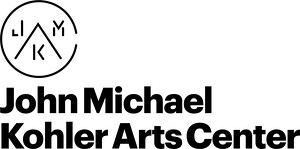Magic City
February 1–July 11, 2021
608 New York Ave
Sheboygan, Wisconsin 53081
United States
Hours: Tuesday–Friday 10am–5pm,
Thursday 10am–8pm,
Saturday–Sunday 10am–4pm
T +1 920 458 6144
F +1 920 458 4473
contact@jmkac.org
Conceived as a modern-day sanctuary, Anthony Olubunmi Akinbola’s large-scale installation explores the commodification of Black culture and the relationship between Africa and Black America through the lens of fetishism.
The evocative nature of objects is at the core of Magic City. Akinbola transforms mass-produced and readymade materials—specifically those with cultural currency in the Black community—into animistic power objects that communicate the complexities of identity. Durags (kerchiefs used to maintain Black hair) replace oil paint as a medium for monumentally scaled color field paintings; hundreds of stacked hair-pomade cans become looming minimalist totems; and a Cadillac Escalade morphs into a pulsating sound sculpture.
Within this temple to objects of worship from African culture, Black America, and beyond, Akinbola uses asymmetric information as a tool to complicate and question issues surrounding identity, commodity fetishism, popular culture, and ritual under capitalism.
Akinbola engages the multiplicity of Blackness—as part of an ancestral lineage and a historical construction—through hybrid artworks. These act as surrogates for his lived experience as a first-generation Nigerian-American male. The objects speak in different codes simultaneously, and their meaning changes depending upon the cultural knowledge and personal perspective of the viewer. The work muddies the waters between artistic intention and viewer comprehension, floating in a liminal space where the multilayered facets of the Black diaspora are brought into focus.
Akinbola has described his work as “metaphors for what a first-generation existence might look like,” and his exploration of cultural belonging through the space between his African and American identity offers a compelling and immersive experience for visitors of all backgrounds.
The fetish—as concept and object—is central to navigating Magic City’s mystical terrain. Akinbola’s contemporary objects of desire highlight the similarities between early African material culture and Karl Marx’s theory of commodity fetishism, a capitalist “religion of sensuous appetites” where consumer goods are venerated and ascribed magical properties and powers.
By tracing the arc of fetishism from Africa to contemporary America, Magic City challenges perceptions of cultural and racial identities by prompting us to question what makes an object “African,” “Black,” “White,” or “American.”
Anthony Olubunmi Akinbola is a Nigerian-American interdisciplinary artist who uses readymade objects to investigate cultural rituals, connections, and the conflicts in the fashioning of identity. Akinbola has been included in solo and group exhibitions at venues including the Queens Museum, New York; the Museum of Arts and Design, New York; False Flag, New York; Zuckerman Museum of Art, Kennesaw, Georgia; and pt. 2 Gallery, Oakland, California. He has been a resident artist at the Anderson Ranch Arts Center, Snowmass, Colorado; DordtYart, Dordrecht, Netherlands; and Verbeke Foundation, Kemzeke, Belgium. He lives and works in Brooklyn.
This exhibition is supported by the Kohler Trust for Arts and Education, the Frederic Cornell Kohler Charitable Trust, Kohler Foundation, Inc., Herzfeld Foundation, and the Wisconsin Arts Board with funds from the State of Wisconsin and the National Endowment for the Arts. The Arts Center and the artist would like to acknowledge Murray’s Pomade for their generous donation of pomade cans for the creation of sculptures in this exhibition.


